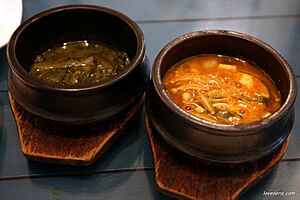Ttukbaegi facts for kids
| Ttukbaegi | |

Two jjigae (stew) served in ttukbaegi
|
|
Quick facts for kids Korean name |
|
|---|---|
| Hangul |
뚝배기
|
| Revised Romanization | ttukbaegi |
| McCune–Reischauer | ttukpaegi |
| IPA | [t͈uk̚.p͈ɛ̝.ɡi] |
A ttukbaegi (뚝배기) is a special kind of earthenware pot used in Korean cuisine. It's a small, strong pot, usually black or brown. People use it to cook and serve many popular Korean dishes. These include jjigae (stews) and gukbap (soup with rice).
One cool thing about a ttukbaegi is that it stays hot for a long time. Even after you take it off the stove, your food will often still be bubbling when it gets to the table! This makes meals served in a ttukbaegi extra warm and delicious.
Contents
History of the Ttukbaegi Pot
The ttukbaegi pot has a long history in Korea. It was first used during the Goryeo Dynasty and became very common during the Joseon Dynasty. People still use it a lot today.
We know the ttukbaegi was used a long time ago because of an old poem. A poet named Lee Dal Chung wrote a poem during the Goryeo period. In his poem, he mentioned "White-makgeolli is brought to the Ttukbaegi." This shows that ttukbaegi pots were already being made and used back then.
Ttukbaegi on Jeju Island
For a long time, ttukbaegi pots were not very common on Jeju Island. Even though they were used a lot in other parts of Korea, people on Jeju Island didn't really need them for their traditional cooking. They often used other types of bowls, like those made from wood or white porcelain.
Some older people on Jeju Island, who are over 90 years old, say they started seeing ttukbaegi pots more often after Korea's liberation in 1945. But it's only been in the last 20 to 30 years that these pots became widely used there. This also makes sense because many traditional Jeju foods don't involve the kind of stews or soups that are usually cooked in a ttukbaegi.
Types of Ttukbaegi Pots
Ttukbaegi pots can be grouped in different ways. We can look at how they are made or what they are used for.
How Ttukbaegi Pots Are Made
- Oji Ttukbaegi: This type of ttukbaegi is covered with a special dark glaze. This glaze makes the pot a solid black color. This way of making pottery has been around since ancient times in Korea.
- Jil Ttukbaegi: This ttukbaegi is not covered with any glaze. It looks very similar to the old earthenware pots from long ago.
What Ttukbaegi Pots Are Used For
- Heat-Resistant Earthenware: These ttukbaegi pots are baked at a very high temperature, about 1,200 degrees Celsius. This makes them very strong and able to handle high heat. They are perfect for boiling foods like soybean paste stew or gyeran-jjim (steamed eggs).
- Normal Earthen Pot: These pots are baked at a lower temperature, around 800 degrees Celsius. They are not as heat-resistant as the other type. The clay mixture used to make them is also different. Normal ttukbaegi pots are good for serving foods like seolleongtang (ox bone soup) or gukbap (soup with rice).
Fun Sayings About Ttukbaegi
Because a ttukbaegi is a simple, plain pot, people in Korea have some interesting sayings about it:
- "Soybean paste stew tastes better than a ttukbaegi looks." (Ttukbaegiboda jangmasi jota; 뚝배기보다 장맛이 좋다.) This means you shouldn't judge something by its simple outside appearance. What's inside can be much better!
- "In the Ttukbaegi, the sauce is bound to boil." (Ttukbaegienun jangul ggeul i gi ma ryun; 뚝배기에는 장을 끓이기 마련이다.) This saying means that everything has its own special purpose.
- "The sound of breaking Ttukbaegi." (Ttukbaegi ggaezinun sori; 뚝배기 깨지는 소리.) This phrase describes a bad or unclear voice. It can also be used to talk about a singer or speaker who isn't very good.
- "Will the wooden ttukbaegi be iron?" (namu ttugbaegiga soe yangpun doelkka; 나무 뚝배기가 쇠 양푼 될까?) This saying means that a bad person cannot easily change into a good person.
- "I broke the ttukbaegi and spilled the soup." (ttugbaegi kkaego gug ssod-assda; 뚝배기 깨고 국 쏟았다) This is like saying one mistake can lead to many problems or losses. It's similar to the idea of someone breaking a large jar and spilling everything inside.
Gallery
-
Sundubu-jjigae served in ttukbaegi
-
Kimchi-jjigae still boiling in ttukbaegi
-
Gyeran-jjim boiled and fluffed in ttukbaegi
See also
 In Spanish: Ttukbaegi para niños
In Spanish: Ttukbaegi para niños
 | Claudette Colvin |
 | Myrlie Evers-Williams |
 | Alberta Odell Jones |




